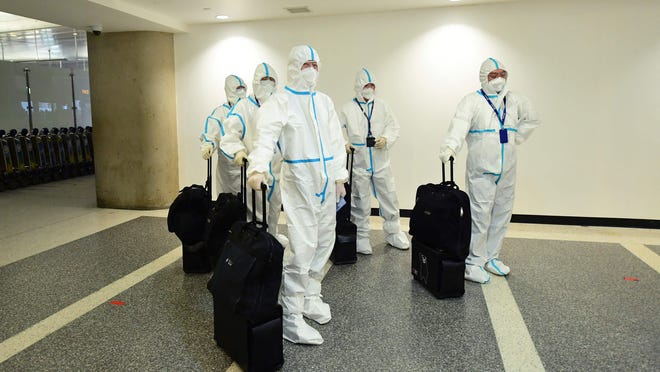
The Centers for Disease Control and Prevention on Monday cut the amount of time it recommends people should isolate after testing positive for COVID-19 and quarantine after coming into contact with someone who tests positive.
The new recommendations are for:
Isolation: For those who are infected with COVID-19, isolation starts the day a person tests positive. The CDC now recommends isolating for five days and going back to normal activities if a person is not showing any symptoms after that period. Previously, the isolation period was 10 days.
Quarantine: For those who come in close contact with someone who tests positive for COVID-19. The CDC is now recommending those who are vaccinated and received a booster shot can skip quarantining if they wear a face mask for at least 10 days. If a person is vaccinated and has not gotten a booster, or if they are partly vaccinated or not vaccinated at all, the CDC recommends a five-day quarantine, then wearing a mask in public for an additional five days.
Previously, the CDC recommended unvaccinated individuals should quarantine for 10 days and those who were vaccinated could skip a quarantine.
The changes come amid a recent surge in cases spurred by the omicron variant and concerns about staffing shortages at hospitals, airlines and businesses across the country. Research has suggested omicron, while more infectious, causes milder illness.
CDC officials say the new guidance is in keeping with growing evidence that people with the coronavirus are most infectious in the two days before and three days after symptoms develop.
“Not all of those cases are going to be severe. In fact, many are going to be asymptomatic,” CDC Director Rochelle Walensky said Monday. “We want to make sure there is a mechanism by which we can safely continue to keep society functioning while following the science.”
Also in the news:
► Apple is temporarily not allowing customers to shop inside its 16 retail stores in New York City as COVID-19 cases surge. Instead, customers can pick up orders from online. Within the past week, the tech company temporarily shut down stores in Miami-Dade County and Palm Beach, Florida; two malls in Atlanta; Houston; and one each in Ohio, New Hampshire and Montreal.
► The Centers for Disease Control and Prevention is investigating Royal Caribbean's Odyssey of the Seas ship as it continues to sail with more than 50 cases of COVID onboard.
► About two dozen sailors on a U.S. Navy warship — roughly 25% of the crew — have tested positive for COVID-19, keeping the ship sidelined in port at Naval Station Guantanamo Bay in Cuba Monday, according to U.S. defense officials.
📈 Today's numbers: The U.S. has recorded more than 52.7 million confirmed COVID-19 cases and more than 818,000 deaths, according to Johns Hopkins University data. Global totals: More than 281.3 million cases and 5.4 million deaths. More than 205 million Americans – 61.8% – are fully vaccinated, according to the CDC.
📘 What we're reading: Mixing up a COVID-19 vaccine cocktail? Here's our guide to mixing and matching Pfizer, Moderna, and J&J booster shots.
Keep refreshing this page for the latest news. Want more? Sign up for USA TODAY's free Coronavirus Watch newsletter to receive updates directly to your inbox and join our Facebook group.
Texas runs out of monoclonal antibody treatment to fight omicron
The Texas state health department has run out of a key treatment to fight the omicron COVID-19 variant, which now makes up 90% of the virus cases in Texas.
On Monday, the Texas Department of State Health Services announced that its regional infusion centers in Austin, El Paso, Fort Worth, San Antonio and The Woodlands have run out of the monoclonal antibody sotrovimab. The state does not expect to receive another shipment from the federal government until January.
Monoclonal antibodies like sotrovimab, drugs derived from people whose immune systems successfully fought off COVID-19, have been extremely effective at keeping high-risk infected people from developing severe disease. But some of these drugs designed to fight COVID-19 like Pfizer's Paxlovid and a similar one by Eli Lilly, which both target the spike protein on the surface of the virus, aren't expected to work against the heavily mutated omicron variant.
Sotrovimab targets a different spot on the virus and appears to still work against omicron. In June, GlaxoSmithKline, which makes the drug along with Vir Biotechnology, showed that sotrovimab reduced by 79% the risk of requiring hospitalization for more than a day or dying from any cause within a month compared to placebo.
The government has spent $1 billion buying doses of sotrovimab to provide at no cost to people who need it. Like other monoclonals, it is expected to run about $2,100 per treatment course.
The drug is in short supply. GlaxoSmithKline and Vir Biotechnology said they are "working with urgency and exploring options to expand our supply capacity," according to spokesperson Kathleen Quinn.
— Nicole Villalpando and Roberto Villalpando, Austin American-Statesman
A man died after a 15-day wait for a medical center bed. His family blames the COVID surge.
Dale Weeks’ family believes he was an indirect victim of the COVID-19 pandemic. The retired Iowa school superintendent died in late November, nearly a month after he was diagnosed with sepsis, a dangerous, blood-borne infection unrelated to the coronavirus.
His daughters think he might have survived if he’d been admitted immediately to a large medical center, where he could have received advanced testing and prompt surgery.
But he stayed for 15 days at Newton’s relatively small hospital because the bigger Iowa facilities said they couldn’t spare a bed for him, his family says. Iowa’s short-staffed hospitals have been jammed for months with patients, including people severely sickened by the coronavirus.
“It’s infuriating that people who are not vaccinated are clogging it up,” said Jenifer Owenson of Des Moines, who is one of Weeks’ four children.
The Iowa Department of Public Health reported Wednesday that nearly 82% of people hospitalized in Iowa for COVID-19 were not fully vaccinated, including 88% of those in intensive care. Overall, 30% of Iowa adults are not fully vaccinated.
— Tony Leys, Des Moines Register
Tested positive for COVID during the holidays?
Testing positive for COVID-19 starts a confusing, disruptive and at times frightening process – one that millions of Americans will likely go through in the coming week.
First, you need to isolate. That’s a more intense version of quarantining – it means cutting off contact with other people as much as possible so you reduce the chance of infecting them. This also means forgoing travel, not going to work and even limiting contact with people in your own household who aren't infected.
The CDC says isolating is a necessary step whether you’re vaccinated or unvaccinated, and whether you have symptoms or feel fine.
Everyone who tests positive for COVID-19 should monitor their symptoms. And people who are unvaccinated or at high risk for severe disease should be extra-vigilant for symptoms that might require emergency care. Call your doctor for early treatment options.
How long should you isolate? How long will I be contagious? What if you are in close contact with someone who tested positive? Here’s what you should know about omicron and COVID this holiday season.
Contributing: The Associated Press
Source link








